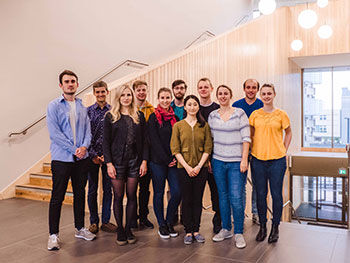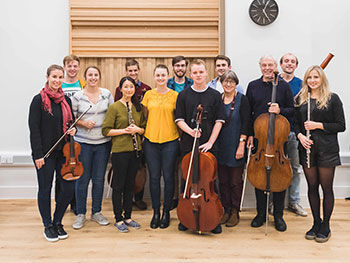University News Last updated 24 September 2018

Birmingham Contemporary Music Group (BCMG) and Birmingham City University’s Royal Birmingham Conservatoire have announced the first 11 musicians to join the NEXT programme, a brand new, innovative programme of study to support early career musicians who want to dedicate their professional life to contemporary music.
Created by Birmingham Contemporary Music Group (BCMG) and Royal Birmingham Conservatoire, NEXT is the only programme in the UK providing intensive, year-long training in contemporary music performance practice, offering musicians an unprecedented opportunity to learn from some of the most exciting performers and composers working today.
One-to-one teaching
NEXT Musicians will receive coaching and one-to-one teaching sessions from BCMG players and world-famous soloists, and will have many opportunities to perform, including in side-by-side concerts with BCMG. Classes in contemporary music history and analysis, instrumental techniques and digital technologies complement musicians’ studies, while regular lectures from artistic directors, publishers and other invited guests from the music industry help with the necessary skills to present and promote new music to different audiences.
NEXT Musicians will work directly with the world’s leading composers on the interpretation of their music and will build and develop their own ensembles and present and design performances using cutting edge performance techniques.
The NEXT Musicians for 2018-19 are:
- Michael Coleby – Conductor
- Iris van den Bos – Percussion
- Nathanael Gubler – Viola
- Boglárka György – Violin
- James Heathcote – Cello
- Ed Pether – Violin
- Tom Pickles – Cello
- Laura Farre Rozada – Piano
- Stanley Kaye-Smith – Bassoon
- Mana Shibata – Oboe and Cor Anglais
- Renate Sokolovska – Flute
Stephan Meier, Artistic Director, Birmingham Contemporary Music Group, said:
“Looking at the role contemporary music plays in our cultural life, and more specifically in the music industry, you tend to find young musicians either orientated towards what is perceived as ‘classical’ music, for example in orchestras or opera, or engaged in self-organised attempts to set up some contemporary activities.
“NEXT seeks to support the latter approach, providing a semi-sheltered greenhouse, as it were, to transfer skills, techniques, knowledge and performance experience, and to allow musicians to fully concentrate on what is needed to professionally work in the sector, and space and time to brood on all kinds of contemporary music developments. There are, of course, opportunities to do this in an informal way but I think that NEXT will be the first year-long course in the UK to address contemporary music performance, practice and promotion in a structured, sustainable way.
Facilities, teaching and lectures
NEXT is free to students already enrolled at Royal Birmingham Conservatoire, or at a subsidised rate of £1,500 for prospective external candidates, to access the Conservatoire facilities, individual instrumental teaching and lectures.

Whilst the course is non-diploma, there is a possibility to combine NEXT with a Royal Birmingham Conservatoire degree-awarding study course. All participants will receive a certificate of study from Royal Birmingham Conservatoire and BCMG.
Professor Julian Lloyd Webber, Principal, Royal Birmingham Conservatoire, commented:
“NEXT builds on Royal Birmingham Conservatoire’s long-standing relationship with BCMG and is designed to significantly impact the next generation of contemporary music and musicians.
“We pride ourselves in being a forward-looking institution. NEXT will be at the cutting edge of new music creation and performance, offering students a unique opportunity to develop their careers in novel and exciting directions.”
NEXT is made possible through the support of Art Mentor Foundation Lucerne.
Images credit – Hannah Fathers